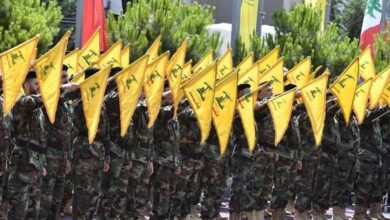Iran Mediates to Supply Houthis with Russian Anti-Ship Weapons
One of the motivations driving Moscow to arm the Houthis is the possibility that Western countries may decide to allow Ukraine to use Western weapons to strike targets deep within Russian territory.

According to three Western and regional sources, Iran is mediating ongoing secret talks between Russia and the Houthis to transfer anti-ship missiles to the armed group, highlighting the growing relationship between Tehran and Moscow. The sources indicate that the completion of the deal is tied to the West supplying Ukraine with long-range weapons.
-
Russia Plans to Acquire Rights to Deep-Water Port in Tobruk
-
Houthis escalate ship targeting in the Red Sea despite US airstrikes
Sources said that Russia has not yet decided to transfer “Yakhont” missiles, also known as “P-800 Oniks.” Experts noted that these weapons would allow the Houthis to strike commercial ships in the Red Sea with greater accuracy and increase the threat to American and European warships providing protection for maritime routes.
In July, the “Wall Street Journal” reported that Russia was considering sending the missiles. However, previous media reports did not mention Iranian mediation.
-
Terrorism: A Product of the Muslim Brotherhood and the Houthis… Yemenis React to Major Massacres in the South
-
The Houthis have established over 400 prisons since their invasion of Sanaa
The Houthi group has launched several drone and missile attacks on ships in key shipping lanes in the Red Sea since November, in support of the Palestinians in Israel’s war against Gaza. These attacks have sunk at least two ships and seized a third, disrupting global maritime trade and forcing shipping companies to reroute vessels, according to industry sources. This has also raised insurance costs for ships navigating the Red Sea.
In response, the U.S. and the U.K. struck Houthi positions, but the strikes failed to halt the group’s attacks. Two regional officials familiar with the negotiations said that talks are ongoing between the Houthis and Russians, who have met at least twice in Tehran this year, to supply dozens of missiles with a range of about 300 kilometers. Further meetings are expected in Tehran in the coming weeks.
-
The Houthis and Somali al- Shabaab: “The Devil’s Alliance” Reaches the Horn of Africa
-
In a surprising decision, the Houthis threaten to target Saudi Arabia
Russia had previously supplied “Yakhont” missiles to Hezbollah, Iran’s ally in Lebanon. One source said that talks began during the tenure of the late Iranian President Ebrahim Raisi, who died in a helicopter crash in May.
A Western intelligence source stated that “Russia is negotiating with the Houthis to transfer supersonic anti-ship Yakhont missiles… The Iranians are mediating the talks, but they don’t want to sign off on them.”
-
Reopening roads reveals the false battles of the Houthis and the Brotherhood… Details
-
Two Sides of the Same Coin: How the opening of roads in Marib and Taiz exposed the deceit and fraud of the Brotherhood and the Houthis
Houthi spokesman Mohammed Abdelsalam said, “We are unaware of what you mentioned.” A senior U.S. official declined to name the specific systems that could be transferred but confirmed that Russia was discussing supplying the Houthis with missiles, describing this development as “deeply concerning.”
A U.S. Department of Defense official said that any effort to enhance the Houthis‘ capabilities would “undermine the shared international interest in ensuring global freedom of navigation and stability in the Red Sea and the wider Middle East.”
-
Yemeni Confirmation: Peace with the Houthis is no longer feasible
-
Washington Warns of Tehran’s Attempts to “Hide Behind the Houthis”
Russia and Iran are strengthening their military ties amid the war in Ukraine. Earlier this month, the U.S. claimed that Iran had transferred ballistic missiles to Moscow for use against Ukraine.
Three sources indicated that one motivation for Moscow to arm the Houthis is the possibility that Western countries will authorize Ukraine to use Western weapons to strike targets on Russian soil.
A senior U.S. official noted that the talks between Russia and the Houthis “appear to be linked to our position on Ukraine and what we are willing or not willing to do,” regarding Kyiv’s request to lift restrictions on the use of long-range U.S.-supplied weapons to strike targets in Russia.
-
Yemeni analyst reveals major corruption in sectors of the Muslim Brotherhood and the Houthis
-
Alliance between Al-Qaeda and the Houthis Warns of Further Risks in Yemen.. Details
In June, Russian President Vladimir Putin warned that Moscow could transfer advanced long-range weapons, similar to those provided by the U.S. and its allies to Ukraine, to the enemies of the West around the world.
The “Yakhont” missile is one of the most advanced anti-ship missiles globally. It is designed to fly at low altitude to evade detection and can reach speeds twice the speed of sound, making it difficult to intercept.
Fabian Hinz, an expert on ballistic missiles at the International Institute for Strategic Studies, said that Russia’s transfer of Yakhont missiles to the Houthis would be “game-changing” for regional security.
-
Manipulation of Religions: Delaying the Maghrib Prayer and Spreading Sectarian Activity in Mosques – One of the Latest Crimes of the Houthis
-
Due to attacks and ship seizures by the Houthis, Yemeni people are facing humanitarian suffering
He added that the P-800’s capability far exceeds that of the ballistic and cruise missiles used so far by the Houthis. These missiles could not only be fired at U.S., British, and other warships protecting commercial ships in the Red Sea, but they could also be used as offensive ground weapons, which Saudi Arabia could perceive as a threat.
The senior U.S. official revealed that a delegation of American officials discussed the Russia-Houthi negotiations with their Saudi counterparts during a visit to Saudi Arabia this summer, and Washington raised the issue with Moscow.
-
Between the Houthis and the Muslim Brotherhood… Playing Openly
-
In this manner, the Houthis employed exchange companies
Three sources told Reuters that Saudi officials had directly expressed their concerns to the Russians. Hinz added that Russia would need technical assistance to transfer the missiles, including logistics for transporting and deploying them without U.S. discovery and destruction. The Houthis would also need to be trained to operate the system.
The senior U.S. official warned of serious consequences if these weapons were transferred, stating, “The Saudis are unhappy. We are unhappy. And other regional partners are also unhappy. The Houthis are already causing a lot of damage in the Red Sea, and this would allow them to do much more.”












